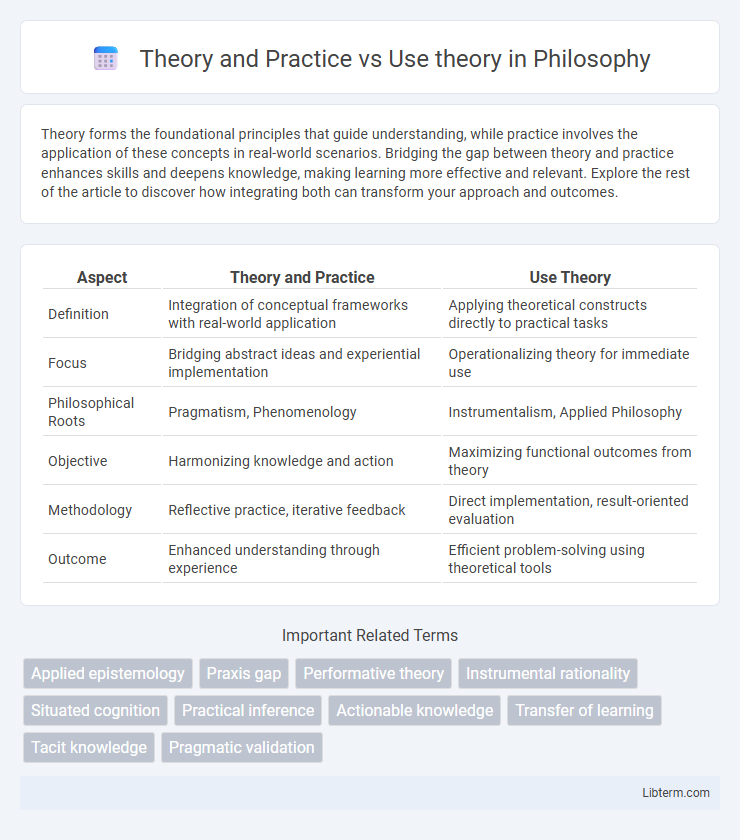Theory forms the foundational principles that guide understanding, while practice involves the application of these concepts in real-world scenarios. Bridging the gap between theory and practice enhances skills and deepens knowledge, making learning more effective and relevant. Explore the rest of the article to discover how integrating both can transform your approach and outcomes.
Table of Comparison
| Aspect | Theory and Practice | Use Theory |
|---|---|---|
| Definition | Integration of conceptual frameworks with real-world application | Applying theoretical constructs directly to practical tasks |
| Focus | Bridging abstract ideas and experiential implementation | Operationalizing theory for immediate use |
| Philosophical Roots | Pragmatism, Phenomenology | Instrumentalism, Applied Philosophy |
| Objective | Harmonizing knowledge and action | Maximizing functional outcomes from theory |
| Methodology | Reflective practice, iterative feedback | Direct implementation, result-oriented evaluation |
| Outcome | Enhanced understanding through experience | Efficient problem-solving using theoretical tools |
Understanding the Gap: Theory and Practice vs Use Theory
Understanding the gap between theory and practice versus use theory reveals significant discrepancies in real-world application and conceptual frameworks. Theory and practice often diverge due to contextual variables and practical constraints that are not accounted for in theoretical models. Use theory emphasizes the adaptation and modification of theoretical principles to address specific user needs, closing the gap by prioritizing functional outcomes over abstract formulations.
Defining Key Concepts: What is “Use Theory”?
Use Theory defines how individuals apply knowledge or information in practical contexts to achieve specific outcomes. It emphasizes the relationship between theoretical understanding and real-world actions, highlighting the functional utility of concepts beyond abstract definitions. This approach underscores the importance of context and purpose in shaping how theories are interpreted and implemented.
Origins and Evolution of Theory-Practice Debates
Theory and practice debates originated in ancient philosophy, notably in Aristotle's distinction between episteme (theory) and praxis (practice), evolving through centuries as scholars emphasized the dynamic interplay between conceptual frameworks and real-world application. The origins trace back to educational and professional fields where theoretical knowledge was often criticized for lacking practical relevance, sparking ongoing discussions about how best to integrate or separate these domains. Over time, this debate influenced diverse disciplines, shaping approaches like experiential learning and evidence-based practice that seek to harmonize theoretical foundations with practical execution.
Practical Application: Bridging Theoretical Insights
Theory and Practice emphasizes the comprehensive understanding of concepts, while Use Theory prioritizes actionable steps in real-world scenarios. Practical Application bridges theoretical insights by transforming abstract knowledge into effective strategies and tangible outcomes. This approach enhances decision-making processes in fields such as engineering, business, and education through applied methodologies.
Use Theory’s Relevance in Modern Disciplines
Use Theory emphasizes practical application and real-world outcomes, making it highly relevant in modern disciplines such as education, business, and technology. By prioritizing hands-on experience and contextual understanding, it bridges the gap between abstract concepts and tangible results. This approach enhances skill acquisition and problem-solving abilities, aligning closely with contemporary demands for adaptive expertise and innovation.
Case Studies: Comparing Theory-Practice and Use Approaches
Case studies highlight the differences between Theory and Practice and Use theory by illustrating how theoretical frameworks often guide initial decision-making, while Use theory emphasizes real-world application and outcome-based adjustments. Comparative analysis of case studies reveals that Theory and Practice approaches prioritize structured methodologies and predictive models, whereas Use theory focuses on adaptive strategies driven by user interaction and contextual needs. Effective integration of both approaches enhances problem-solving by balancing normative guidelines with pragmatic flexibility in diverse scenarios.
Benefits of Integrating Use Theory into Practice
Integrating use theory into practice enhances decision-making by providing actionable insights grounded in real-world applications, improving effectiveness across various fields. This approach bridges the gap between abstract concepts and tangible outcomes, facilitating adaptive strategies that respond to evolving challenges. Organizations benefit from increased innovation and efficiency through the continuous feedback loop created by applying use theory within practical contexts.
Challenges in Translating Theory to Real-World Use
Translating theory into real-world use presents challenges such as contextual variability, where theoretical models may not account for environmental or cultural differences. Practical constraints like resource limitations and user behavior often hinder seamless implementation of abstract concepts. Bridging the gap requires adaptive strategies that align theoretical insights with tangible, situational demands.
Future Directions: Evolving Paradigms in Applied Theory
Future directions in applied theory emphasize the integration of adaptive frameworks that bridge the gap between abstract principles and practical implementation. Emerging paradigms focus on dynamic models leveraging real-time data analytics and machine learning to enhance decision-making processes. This evolution fosters more responsive, context-sensitive applications that align theoretical insights with rapidly changing environmental and technological conditions.
Conclusion: Harmonizing Theory, Practice, and Use Theory
Harmonizing Theory, Practice, and Use Theory enhances the effectiveness of knowledge application across disciplines by integrating conceptual frameworks with real-world usability. This approach fosters adaptive systems that evolve through iterative feedback between theoretical models and practical implementation. Emphasizing the synergy among theory, practice, and use theory ensures optimized outcomes in problem-solving and innovation processes.
Theory and Practice Infographic

 libterm.com
libterm.com